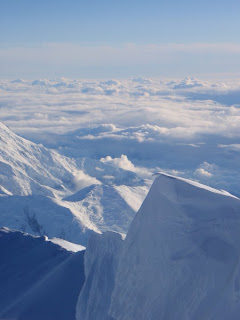Most recently I just returned from an 18 day expedition on Denali's West Buttress. I participated in this trip as an "assistant guide," which means I couldn't quite lead a rope team, but I could cook! Essentially, I got a free trip up to Alaska to climb in a beautiful range, on a beautiful mountain, with some extremely experienced and quality guides. However for whatever reason, I wasn't as stoked before the trip as I should have been. I thought the West Buttress was just some three week slog up a wide snow slope with minimal to no technical climbing.
In some way, that is exactly what it is. But while I was on the trip, my opinion started to change. It wasn't because the loads got lighter over time, or that the altitude was messing with my head - it was the continual conversations I had with my team members and other climbers that changed my mind. I remember one specific conversation that went like this.
Me: "You know, my favorite type of climbing is when the climb lasts no more than two days. I can fit all my gear in a 30L pack and go work myself over the course of a few days to get up something truly exciting. I like it to be steep, and full of exposure, and be logistically pretty simply."
Climber: "Yeah, that does sound fun. I do enjoy ice climbing, and technical rock is great, but my most favorite type of climbing, what I really yearn to do, is steep snow. That's why I love climbs like the West Buttress"
A steep snow slope... at the top of Motorcycle Hill on Denali
Steep snow!? Really dude? My initial thought was, man that is the one type of "climbing" that I could do without! I see steep snow as an inevitable object in the way of more exciting climbing. It is in no means an "end" in and of itself. However seeing this climber's passion for the route, and for the location and views it exposed him too, I started to gain an appreciation for it.Sure I wasn't being challenged technically, but that meant I had the time to look around and to appreciate the clean mountain air I was breathing. More often than not I'm thinking about technical systems or how to manage rope drag, instead of how beautiful the ridge top looks when the sun is setting and the alpenglow starts to take form. Moving up the ridge between 16,000 and 17,000 feet I wasn't thinking about the level that I climb at, but simply where I was climbing and how stunning the Alaska range is.
Furthermore, I found myself enjoying the social experience of Denali. I was rubbing shoulders with climbers from every country of the world, and heard more languages at 14,200 in Alaska than in most international airports. Where else can you share a shot of vodka with a Romanian climbing team, and then have some fish with a Japanese team that were drying it in the sun - hung between two trekking poles? While I'm usually not one to randomly engage people in "climber talk," I really appreciated the opportunity to meet people from other places and observe their climbing style and ethics.
Overall, at the end of the trip, I found myself a little ashamed of my initial attitude towards the route and the style of climbing. I judged the climb and the type of people who do it before I even attempted it myself. Sure the physical challenge is there, and yes the mental obstacles are numerous, but I am truly looking forward to going back to Alaska and climbing that mountain again. If I stand on the summit again, I guess that's cool. But really I'm excited to simply be on the mountain, to see the views, the meet the people, and to experience the trip as a whole. I'm so thankful that my original view of the mountain was crushed, and that now I can really enjoy and appreciate expedition style climbing.
If you've ever been too focused on "your style of climbing" and haven't given much credence to routes like the West Buttress, and haven't given it a try, then you are doing yourself a disservice. I highly recommend you challenge your prejudices, and yourself, by giving the climb a fair chance. If not, you are missing out.
Andrew Yasso - Program Coordinator
(All photos by the author)
(All photos by the author)




